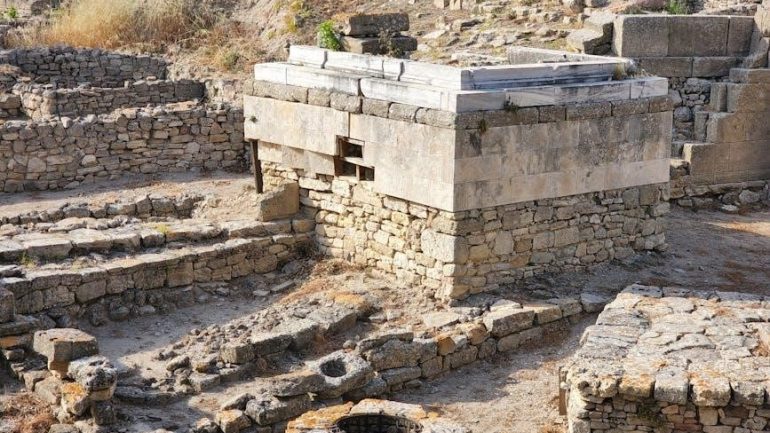The Iliad‚ an epic poem attributed to Homer‚ explores the Trojan War’s final year‚ focusing on Achilles’ wrath. Themes of honor‚ glory‚ and mortality resonate deeply.
Available in PDF formats with various translations and annotations‚ it remains a cornerstone of classical literature‚ accessible to modern readers.
Background and Composition Date
The Iliad‚ an ancient Greek epic poem‚ is traditionally attributed to Homer and dated to the 8th century BC. Its composition is believed to stem from earlier oral traditions‚ capturing the final year of the Trojan War. The poem focuses on the clash between Greek and Trojan forces‚ highlighting themes of honor and glory. PDF versions‚ including translations like those by A.T. Murray‚ offer modern readers access to this foundational work of European literature‚ preserving its rich historical and mythological context for global audiences.
Significance in European Literature
The Iliad is a cornerstone of European literature‚ shaping the epic narrative tradition and influencing countless works. Its universal themes of human emotion‚ conflict‚ and heroism have resonated across centuries. As a foundational text‚ it has inspired art‚ literature‚ and thought‚ bridging ancient and modern cultures. Available in PDF formats‚ including translations by Samuel Butler and A.T. Murray‚ it remains accessible to readers worldwide. Its enduring relevance underscores its role as a cultural and literary touchstone‚ continuing to inform and inspire contemporary audiences.

The Authorship of the Iliad
The Iliad is traditionally attributed to Homer‚ an 8th-century BC poet‚ though debates persist about his existence and whether the work is by a single or multiple authors.
Homer and His Legacy
Homer‚ traditionally credited with the Iliad and the Odyssey‚ is celebrated as one of the greatest poets in ancient Greek literature. His works are foundational to European literary tradition. While little is known about his life‚ Homer is often depicted as a blind poet from Chios. The Iliad‚ attributed to him‚ showcases his mastery of storytelling‚ exploring themes of heroism and human nature. His legacy endures through translations and adaptations‚ making his epics accessible to modern readers in PDF formats like the Loeb Classical Library editions and the Internet Classics Archive.
Debate Over Single vs. Multiple Authors
The authorship of the Iliad has long been debated‚ with scholars questioning whether it was the work of a single poet or multiple contributors. Traditionally attributed to Homer‚ the poem is believed by some to reflect the oral traditions of ancient Greece‚ suggesting a collective evolution over generations. Modern scholars argue that the Iliad may have been compiled from earlier sources‚ with possible contributions from multiple poets. This debate highlights the complexity of tracing the poem’s origins‚ leaving its authorship a subject of enduring scholarly discussion and speculation.

Structure and Content of the Iliad
The Iliad is divided into 24 books‚ focusing on Achilles’ wrath and the final year of the Trojan War. Themes of honor and glory are central.
Divisions into Books
The Iliad is divided into 24 books‚ each focusing on specific events or themes. This structure allows readers to follow the narrative’s progression and key moments.
PDF versions‚ such as the Loeb Classical Library editions‚ include bookmarks for easy navigation. Each book explores different aspects of the Trojan War and Achilles’ story.
Major Themes: Honor‚ Glory‚ and Mortality
The Iliad explores themes of honor‚ glory‚ and mortality‚ central to its narrative. Honor drives the characters’ decisions‚ while glory is sought through heroic deeds. Mortality looms as warriors confront their fate.
Achilles’ wrath and Hector’s nobility exemplify these themes. The interplay of human ambition and divine influence highlights the transient nature of life and the enduring pursuit of legacy‚ resonating deeply with readers across centuries.
Main Characters of the Iliad
Achilles‚ the central hero‚ embodies rage and valor. Hector‚ the noble Trojan prince‚ fights to protect his city. Agamemnon leads the Greeks‚ while Helen’s abduction sparks the conflict.
Achilles: The Central Hero
Achilles‚ renowned for his unmatched bravery and devastating wrath‚ stands as the Iliad’s central figure. His rage‚ sparked by Agamemnon’s dishonor‚ drives the poem’s narrative. Achilles’ near-invulnerability‚ save for his heel‚ underscores his legendary status. Despite his formidable prowess‚ his human vulnerabilities and deep emotions—grief over Patroclus and conflicted honor—make him a complex‚ relatable character. His decisions and struggles define the epic’s exploration of heroism‚ pride‚ and mortality‚ cementing his place as one of literature’s most iconic heroes.
Hector: The Trojan Prince
Hector‚ the noble prince of Troy‚ emerges as a tragic hero in the Iliad. He is portrayed as a skilled warrior and compassionate leader‚ deeply committed to his city and family. Hector’s duel with Achilles‚ culminating in his tragic death‚ is one of the poem’s most poignant moments. His humanity shines through his interactions with loved ones‚ such as his wife Andromache and son Astyanax‚ highlighting the personal cost of war. Hector’s honor‚ duty‚ and vulnerability make him a compelling figure‚ embodying the complexities of heroism and fate.
Agamemnon and Helen: Key Figures in the Conflict
Agamemnon‚ the powerful king of the Achaeans‚ leads the Greek army in the Trojan War‚ driven by the abduction of his brother Menelaus’s wife‚ Helen. Helen‚ whose beauty sparked the conflict‚ is portrayed as both a symbol of desire and a pawn in the struggle for honor; Agamemnon’s leadership is marked by tension‚ particularly with Achilles‚ over issues of pride and authority. Their roles in the Iliad highlight the personal and political dimensions of the war‚ illustrating how individual motivations shape the broader conflict.
Historical and Mythological Context
The Iliad is set in the 8th century BC‚ recounting the legendary Trojan War between Greeks and Trojans‚ blending historical elements with mythological divine interventions.
The Legendary Trojan War
The Trojan War‚ central to the Iliad‚ was a ten-year conflict between Troy and Greece‚ sparked by Helen’s abduction by Paris. The epic poem captures the final year‚ highlighting key battles and the clash of legendary heroes like Achilles and Hector. The war’s climax‚ involving the infamous Trojan Horse‚ shaped its legacy‚ though the Iliad concludes before the horse’s deployment. This mythological conflict blends historical elements with divine interventions‚ offering insights into ancient Greek culture and warfare. PDF versions of the Iliad provide detailed accounts‚ enriching understanding of this pivotal event.
Interplay Between Mortals and Deities
The Iliad vividly portrays the interplay between mortals and deities‚ with gods like Zeus‚ Hera‚ Athena‚ and Apollo actively influencing the Trojan War. These divine beings often intervene to aid their favored warriors‚ shaping the conflict’s outcome. Achilles‚ a demigod‚ embodies this connection‚ as his mother‚ Thetis‚ petitions Zeus for his honor. The poem highlights the tension between human free will and divine control‚ with mortals grappling with their destinies. This divine-mortar dynamic enriches the narrative‚ offering insights into fate and human limitations. PDF editions of the Iliad‚ such as the Loeb Classical Library‚ provide annotated details of these interactions.

Cultural and Literary Impact
The Iliad is a foundational work in European literature‚ influencing countless authors and shaping themes of heroism and fate. Its legacy endures in modern adaptations and studies.
Influence on Western Literature
The Iliad’s profound influence on Western literature is evident in its exploration of conflict‚ human nature‚ and divine intervention. Themes of honor and mortality have shaped countless works‚ from classical tragedies to modern novels. Its epic structure and character development set a precedent for narrative storytelling. Translations and adaptations‚ such as those by Samuel Butler and A.T. Murray‚ have made the Iliad accessible to diverse audiences‚ ensuring its timeless relevance and enduring impact on literary traditions worldwide.
Translations and Adaptations Over the Centuries
The Iliad has been translated and adapted numerous times‚ preserving its legacy. Notable translations include Samuel Butler’s 1898 version and A.T. Murray’s Loeb Classical Library editions. These translations‚ available in PDF formats‚ offer accessible reads for modern audiences. Additionally‚ the revised Rieu translation by D;C.H. Rieu and Peter Jones provides a contemporary prose interpretation. Such adaptations ensure the Iliad remains a vital part of literary heritage‚ bridging ancient and modern cultures through its enduring themes and storytelling.
The Iliad in PDF Format
The Iliad is widely available in PDF format‚ with notable editions like the Loeb Classical Library volumes combining multiple translations in a single file.
These PDFs often include bookmarks‚ searchable text‚ and annotations‚ making them accessible for scholars and modern readers alike to explore Homer’s epic masterpiece.
Available Translations and Editions
The Iliad is available in various PDF translations‚ including the Loeb Classical Library editions‚ which combine volumes L170 and L171 into a single searchable file.
Translations by A.T. Murray and Samuel Butler are popular‚ with Murray’s version offering a classical perspective and Butler’s providing a more modern readability.
Revised editions‚ such as those by D.C.H. Rieu and Peter Jones‚ cater to contemporary readers‚ ensuring the epic remains accessible while preserving its original depth.
These PDFs often feature bookmarks‚ annotations‚ and multilingual resources‚ enhancing the reading experience for both scholars and general audiences.
Loeb Classical Library Editions
The Loeb Classical Library offers esteemed editions of the Iliad‚ combining volumes L170 and L171 into a single PDF. These editions‚ originally published in 1924/1925‚ feature A.T. Murray’s English translation alongside the original Greek text‚ providing scholars and readers with a comprehensive resource.
The PDF is fully searchable and bookmarked for easy navigation‚ making it a valuable tool for academic study and personal reading. These editions are renowned for their meticulous scholarship and faithful representation of Homer’s epic poetry.

Reading Guides and Annotations
Annotated versions of the Iliad in PDF format provide essential context‚ enhancing understanding of the poem’s themes and historical background for modern readers.
These resources are crucial for unpacking the complexity of Homer’s epic‚ offering insights into its literary and cultural significance.
Importance of Annotated Versions for Understanding
Annotated versions of the Iliad in PDF format are indispensable for modern readers‚ offering insights into the poem’s complex language‚ historical context‚ and mythological references.
These annotations clarify themes‚ character motivations‚ and cultural nuances‚ making Homer’s epic more accessible. They also highlight the interplay between mortals and deities‚ essential for grasping the narrative’s depth and significance.
Recommended Resources for Modern Readers
Modern readers seeking to engage with the Iliad can benefit from annotated PDF editions‚ such as those from the Loeb Classical Library‚ which combine the original Greek text with English translations.
Revised translations by scholars like D. C. H. Rieu and Peter Jones offer clearer prose‚ making the epic more accessible. Additionally‚ online platforms provide downloadable versions‚ such as the Internet Classics Archive‚ featuring Samuel Butler’s translation. These resources‚ along with guided annotations‚ help readers navigate the poem’s complexity and historical context‚ ensuring a deeper understanding of Homer’s masterpiece.




